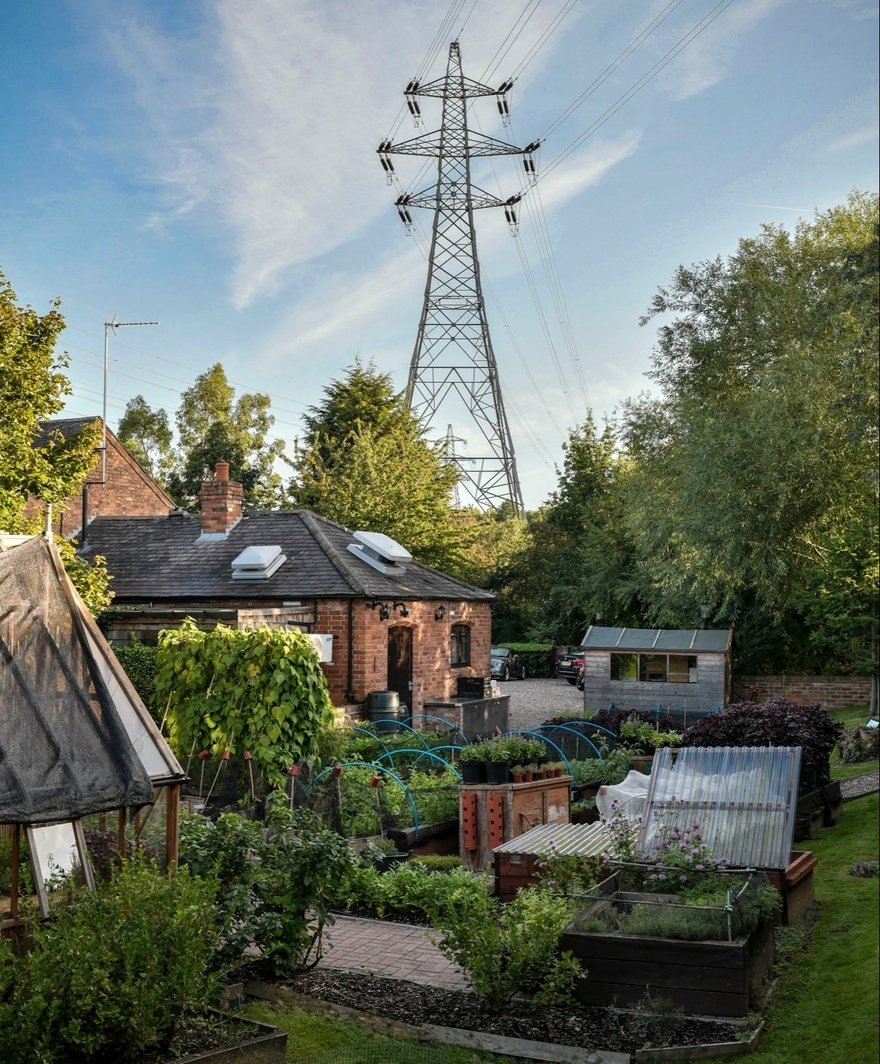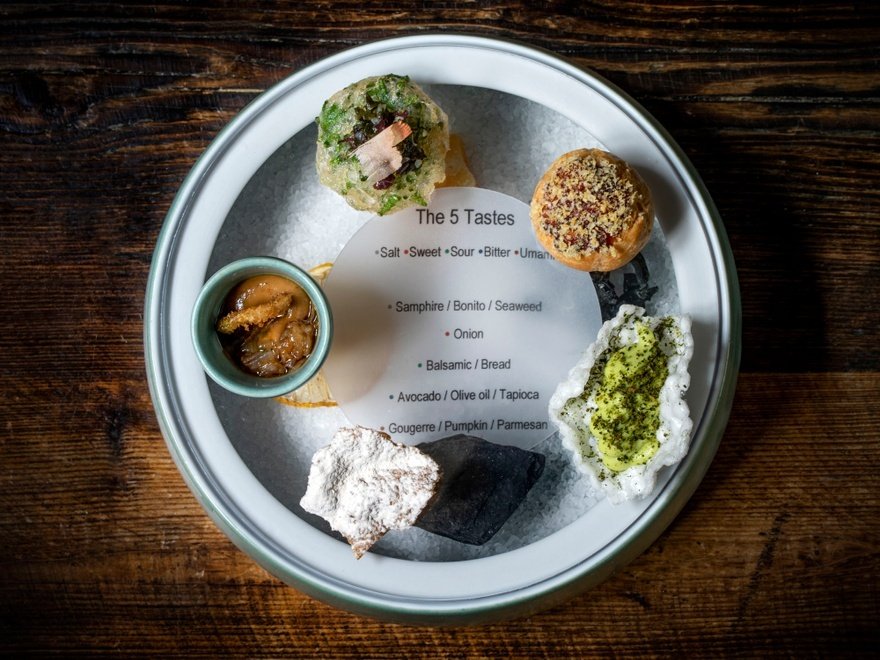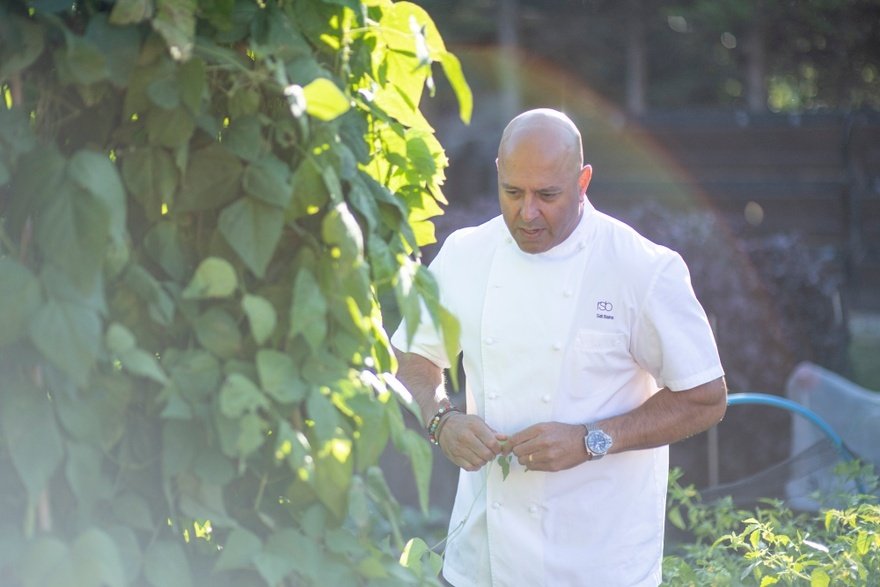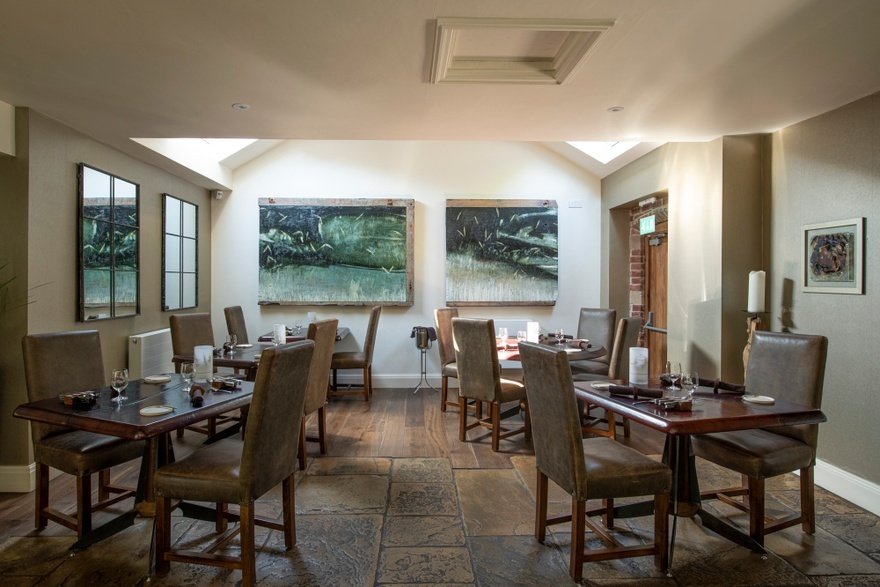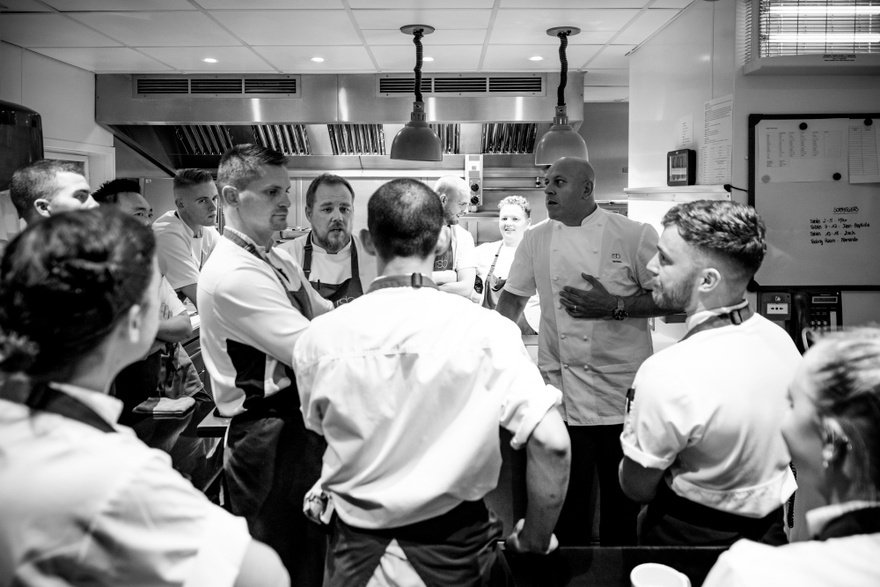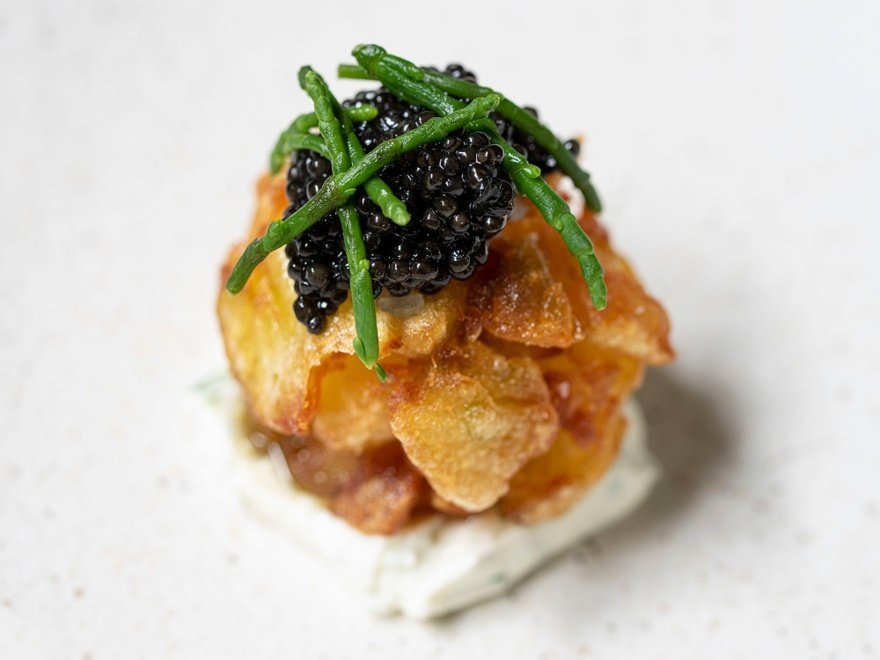Over 20 years Sat and Amanda Bains have created one of the UK's leading restaurants in the most unassuming of locations. Fiona Sims meets the uncompromising chef and his wife at the two-Michelin-starred restaurant
Forget a gentle meander down a quiet country lane to this destination restaurant with rooms on the outskirts of Nottingham. Restaurant Sat Bains (RSB) is reached by an easy-to-miss slip road off a six-lane carriageway, with a flyover thundering over the Trent River to one side and electric pylons fizzing overhead on the other. Cliveden it's not. But the incongruous location is part of what makes it so special – that, and the food, of course.
Owners Sat and Amanda Bains are now well into their 20th year on that slip road. Build it and they will come, they hoped, and they did – in droves, among them top chefs who readily declared that it serves some of the best cookery in Britain. The Michelin guide inspectors agreed, awarding it two stars in the 2012 guide, which joined RSB's other accolades, including The Observer Food Monthly Best Restaurant in 2008. And to think it began life as a nondescript 1980s redbrick motel thrown up on the site of a compulsorily purchased farm.
From the outset, Bains had a vision and a mission. As the newly crowned winner of the Roux Scholarship in 1999, widely regarded as the toughest chef competition in the country, he could have had his pick of places to work – indeed, Raymond Blanc offered him a job.
But he chose something rather more left-field – to create a destination restaurant in a nondescript location. Instead of taking his place in a famous kitchen, he took over the French bistro in a Nottingham hotel that had been snapped up from the receivers, quickly becoming a partner in the business. Then, after five years, the couple bought their current venue.
Aiming for the stars
In 2003 they achieved their first Michelin star, followed by a second eight years later. And no, before you ask, there is no passing traffic here – people have to make the effort to come, those with further to travel staying in one of seven smart rooms on-site.
"I wouldn't move. I love the randomness of the location. This food wouldn't work anywhere else," grins Bains, as we take a turn around his kitchen garden. Bordering the fast-flowing river Trent on one side and the old farm on the other, the repurposed Victorian outbuildings are surrounded by numerous raised beds, beehives, composting bins and potting sheds, a duck-plucking station, wood-fired ovens, Green Egg barbecues, greenhouses (one just for micro greens) and ranks of herb-filled window boxes crammed onto any spare bit of brick wall.
"The essence of the menu is to offer the best produce that we can afford and cook it with understanding, craftsmanship and absolute balance," explains the chef, who is intense one minute and jovial the next. He credits his numerous trips to Japan for this approach, and admits that he is still surprised that it won him a second Michelin star.
"We've never known where we sat with regards to Michelin stars. Everyone automatically thinks we want to get three now. But why can't we just have a really good restaurant with two stars? Though don't mistake that for complacency – the drive to be the best is still very single-minded," stresses Bains.
The restaurant offers a tasting menu only, either seven or 10 courses, priced at £105 and £120 respectively, with a range of dietaries catered for except for vegans – his views on which got him into a social media mangle a few weeks back.
The current menu includes dishes such as warm tartare of Wollaton Hall fallow deer served with beets, truffle, oak and pine; steamfried potato (basically a big chip) loaded with caviar, moistened with a slick of seaweed velouté; a wonderfully earthy mushroom quiche with deep-fried lichen and a smoked oak truffle mayo; and a partridge ragù on a tagliatelle of kohlrabi that had been poached in a butter, dashi and nutmeg emulsion.
A statement at the top of the menu declares it has been created using the five tastes – salt, sweet, sour, bitter and umami. Bains loves it when people say they've never tasted anything like it before. "Yet all the ingredients are familiar," he says. One of the more extreme examples is the chocolate marquise, listed on the menu alongside its other key ingredients of salt, pepper and vinegar. "You're probably thinking, WTF, this doesn't make sense. But in the mouth, it's mind-blowing. We want to gain their trust – that's the key."
He explains the creative process at RSB. "Every Saturday, me and six senior chefs get together to brainstorm. We always invite a different junior chef to take part. Why? Because they could come up with something crazy good which could be the missing link.
"I actually want someone to fuck it all up – because that's how I think. I haven't got a bank of dishes learned from working in top restaurants, so I'm starting from scratch, which has given me more freedom. There's nothing I can't do. And when you're free, you're happy."
Humble beginnings
Unlike many chefs, Bains didn't have a foodie upbringing. He is a second-generation Punjabi-heritage Brit (his full name is Satwant Singh Bains), whose parents settled in Derby in the 1960s. He was expected to take over his dad's newsagent business and have an arranged marriage, but that didn't work out.
And it wasn't food that sparked his interest initially, more the social side of eating. "Cooking was a chore for mum because she worked," explains Bains. "What we ate growing up was delicious, but it wasn't the best. We wanted sausages and chips and all that. When my mum cooked Indian food, we groaned. The love of food really grew from getting together with the extended family."
It was during the school holidays that a mate suggested he went to an open day at college, where he was introduced to the catering course. "I always enjoyed home economics at school, so I signed up. I loved the discipline, the pristine whites, the lectures from the French chef. It was such a contrast to my upbringing. And the more time I spent there, the less time I had to spend working in dad's shop," he remembers.
Bains took a job as a commis chef in a local hotel when he was 18, where he met Amanda, who was the restaurant manager. When his parents found out about his non-Indian girlfriend, they chucked him out. The family get on now though, says Sat, and his parents are proud of what he has achieved. His proudest moment in the last 20 years?
"Winning the Roux Scholarship," he replies, quickly. "I was a complete outsider. In fact, I was unemployed. I had no pedigree – I'd never trained in any top kitchens. Then they called out my name and I thought, this is it, this is my chance." The rest is history, as they say.
His lack of classical training means he often draws inspiration from unlikely sources, including the art world. In fact, Bains says that if he hadn't become a chef, he would have been an artist. "Art fascinates me. I love all the abstract stuff, such as Mark Rothko," he explains, showing me pictures on his phone of sketches of dishes he has made that have been inspired by works of art, among them a beetroot tartare he created after a trip to see Antoni Gaudí's work in Barcelona.
And there's his potato waffle (served as a stunning dessert with cinnamon sugar and a blackcurrant crème pâtissière), inspired by an Anish Kapoor sculpture he found in a book. In fact, Bains reveals that the drawing of the dish always comes before the recipe. "I'm just a creative whose medium is food. I don't even look at myself as a chef. When I started here in 1999, I didn't know what I was doing. I learned how to cook when I was here. But I've loved the process of that journey, which has allowed our food, our mindset, our service and our location to be totally unique."
Down to business
Amanda now joins the conversation after interviewing a prospective sommelier (they have five), a potential new addition to the now 48-strong team (they started with seven). She runs the business side of things at RSB, as well as managing front of house. Has it been a commercial as well as a culinary success? "We can't complain," she replies, with a grin.
The couple credit a big part of their success to key staff. There's a trail of impressive chef alumni, among them Niall Keating and Jordan Bailey, Paul Foster and Alex Bond, with head chef John Freeman still leading the way after 18 years working with Sat, who references him often and with great affection. "Our chefs work with us, not for us. We are part of their journey and growth as much as they are part of our continued journey of excellence."
The business improved further when they decided to move to a four-day week at the end of 2015, says Amanda. "Our accountant said we were crazy, but as we saw it staff got a better way of life and it gave us three consecutive days off to do maintenance or just chill," she says. Sat adds: "It also means the staff are on fire, and they stay for a minimum of two years. Recruiting is easier, too, with all the other benefits that we offer."
What's a key lesson that they've learned in their 20 years in the business? "What not to do," Amanda says. "We see what we don't like and we ensure that we don't do it. We really believe that this is what has chiselled us." Any examples? "Who benefits from a 10-course tasting menu that takes five hours?" shrugs Sat (I cracked through 10 courses in a comfortable two hours). Amanda adds: "When guests see a messy tableplan as soon as they walk in. We keep it invisible and do a discreet tick."
So, what next? Have they ever been tempted to expand? "It was hard enough doing Northcote in January," jokes Sat, about the annual celebrated culinary event in Lancashire, where he was a guest chef. "It's a brilliant gig, but I reckon we suffered from a lack of essence, flavour and depth by around 15%. It normally takes 14 chefs to produce those same dishes but I only had four chefs, so you get an inevitable dilution and that's what scares me."
"We also have to ask ourselves, why would we want to expand? We have three days off a week, we get time together, we make a decent living – we've got all we want in life. Though we'll never say never," reasons Amanda.
What's next?
It turns out that the couple, who don't have children, do have future plans of sorts – in the southern hemisphere. "We have 10 years left on the lease here," says Sat. "Amanda will be 60 then, and I'll be right behind her. We want to be fit and healthy when we retire.
"One of our biggest draws is Australia, in particular Melbourne. I see such beautiful food from different cultures there – it's a hotbed of amazing flavours. My cooking is magpie cuisine – I steal a little from India, but also from Singapore, Thailand and other areas in Southeast Asia. That's why I love Australia – they are brilliant at spicing. So we might open something there. Nothing like this, maybe a tapas bar, but until then my name is on the door, and this is where I'll be, four days a week."
You'll not find him on TV either – or not often. "If I never did TV again, I wouldn't worry," he says, claiming to feel uncomfortable with the medium, and limiting his appearances to those that work around the restaurant.
Sat limits his appearance on the restaurant floor, too – he's not one for working the tables. "I'm not great at being with people I don't know. I find it awkward talking to guests. What I say can easily be misconstrued as arrogance. But I can't do anything halfway – I find it difficult to temper myself. I'm better off staying in the kitchen," he snorts, with a shrug.
If you want to see Sat in the flesh, it's best to book the Chef's Table, adjacent to the kitchen, where the brigade takes it in turns to serve dishes. Or book the Kitchen Bench, perched over the stoves in the thick of the action. Both are available for lunch when the main dining room is closed, as is Nucleus, a restaurant within the development kitchen.
How does it make him feel looking back on the last two decades? "Incredible. Proud. We were fly-by-nights, but we kept on going at it and we kept getting better at it. If I had my time again would I do anything do differently? Nope. I can't say I would," says Bains, before retreating to the kitchen.
Restaurant Sat Bains
- Lenton Lane, Nottingham NG7 2SA
- 0115 986 6566
- www.restaurantsatbains.com
- Owners Sat and Amanda Bains
- Restaurant covers 50, plus 6-8 on chef's table, four on kitchen bench and six in Nucleus
- Head chef John Freeman
- Restaurant manager Innes Haywood Number of staff (kitchen and front of house) 46
- Number of staff (kitchen and front of house) 46
Restaurant Sat Bains alumni
Emma McCaskill, executive chef, Sparkke at the Whitmore, Adelaide, Australia
"Sat was an incredible chef to work with. His unrelentless passion for food was infectious and he kept us on our toes every single day. There was never a dull moment. It wasn't an easy kitchen to work in – everything was made from scratch, food was foraged, attention to detail was everywhere – but I learned how to push beyond limits. Sat is a true master of the cooking craft."
Jordan Bailey, executive chef, Aimsir, Cliff at Lyons, Kildare, Ireland
"Working with Sat was everything I needed at the time – a regimented environment, exciting food and a driven team. It really set me up in my chef career and helped me to go on and conquer everything I have achieved to date."
Paul Foster, chef owner, Salt, Stratford-upon-Avon, Warwickshire
"Sat is one of the most driven and inspiring chefs I have ever worked for. His passion for creating a world-class restaurant is infectious. I left nearly 10 years ago but I still have Sat's voice in the back of my head when I'm working. Through hard work and determination, Sat and Amanda have created the best restaurant in the country. Without their inspiration and encouragement, I would never have opened Salt."
Niall Keating, executive chef, Whatley Manor Hotel & Spa, Malmesbury, Wiltshire
"I've always admired the way Sat runs his kitchen. The hierarchy works on a mutual respect between him and each individual – something I try to emulate within my team now. His creativity is incredible, and without the time I spent working and learning from him, I'm sure I wouldn't be in my position today."
The menu
- ‘The Introduction': The five tastes: sweet/salt/sour/bitter/umami
- Warm crab, turnip, butter curry
- Veal sweetbread, miso, cabbage, sauce Robert
- Steamed-fried potato, Baerii prestige caviar
- Chawanmushi, wild mushroom, sea leek
- Squab pigeon ‘tagine spice', carrot/pastilla/chicory, barbecue sauce
- Cornish turbot, morels, wild garlic, truffle tapenade
- ‘The Crossover': tomato and thyme "jammy dodger", carrot and almond sherbet "dib-dab"
- Chocolate marquise, salt, pepper, 25-year-old balsamic vinegar
- Our first honey, crème fraîche, pollen, grains
- ‘The Conclusion': The five tastes: sweet/salt/sour/bitter/umami
Seven courses, £105/£115 from May, ten courses, £120/£130 from May
Continue reading
You need to be a premium member to view this. Subscribe from just 99p per week.
Already subscribed? Log In


